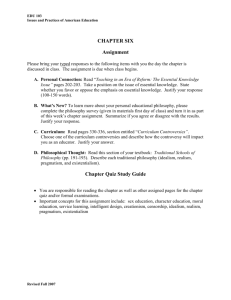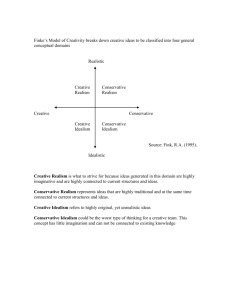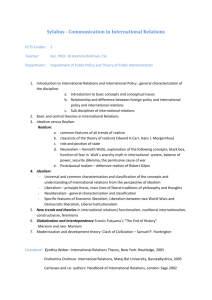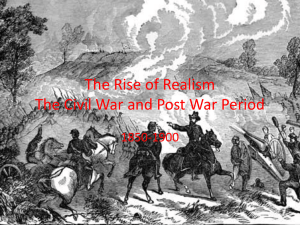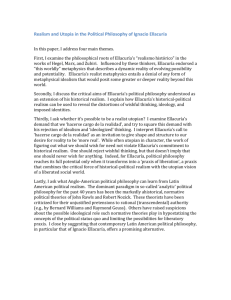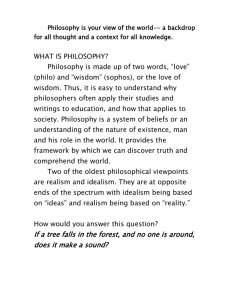Philosophy of the Social Sciences
advertisement
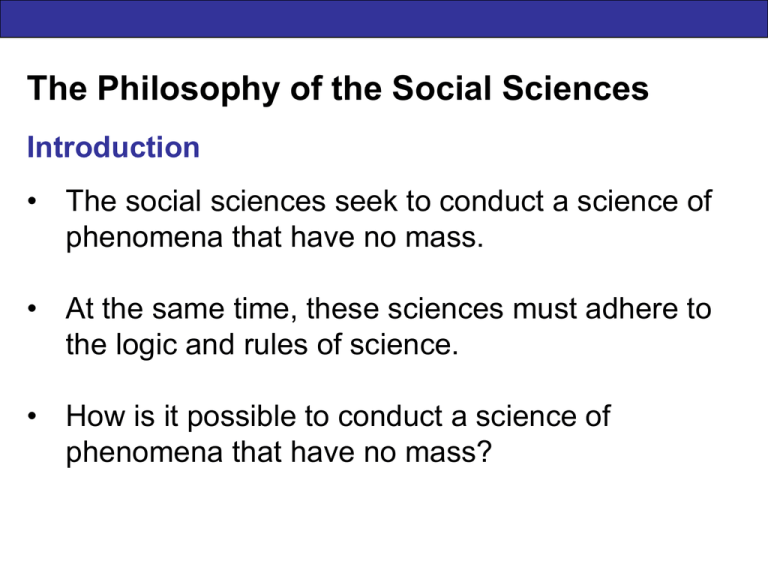
The Philosophy of the Social Sciences Introduction • The social sciences seek to conduct a science of phenomena that have no mass. • At the same time, these sciences must adhere to the logic and rules of science. • How is it possible to conduct a science of phenomena that have no mass? The Philosophy of the Social Sciences Realism vs. Nominalism: Definitions • Realism: Abstract concepts are real in their consequences. • Nominalism: Abstract concepts reflect the logical error of reification: misplaced concreteness based upon unnecessary subjectivity. The concrete is real. The Philosophy of the Social Sciences Realism vs. Nominalism: Role of the Scientist • Realism: Observe, as best as possible, the consequences of abstract reality. • Nominalism: The social scientist has no other option but to observe the actual behavior of humans. Collective behavior is the simple aggregation of individuals’ behaviors. The Philosophy of the Social Sciences Realism vs. Nominalism: Issues Facing Science • Realism: Challenged by obtaining valid and reliable measures. How does one measure an abstract concept? • Nominalism: Challenged by understanding collective behavior. What is the basis of social order? The Philosophy of the Social Sciences Realism vs. Nominalism: Application • Realism: Observations and interpretations can be used to understand abstract concepts. • Nominalism: Observations and interpretations can be used to advance “grounded theory”: theory that can be traced to direct observations of human behavior. The Philosophy of the Social Sciences Realism vs. Idealism: Definitions • Realism: One reality to be observed as best as possible. • Idealism: Multiple realities, each valid at the same time. The Philosophy of the Social Sciences Realism vs. Idealism: Role of the Scientist • Realism: Observe as best as possible. “Data speak for themselves.” • Idealism: The scientist has no option except to impose structure upon observations. “Data do not speak for themselves.” The Philosophy of the Social Sciences Realism vs. Idealism: Issues Facing Science • Realism: Can be challenged by aberrations in observations. • Idealism: Can be challenged by differences in observations. The Philosophy of the Social Sciences Realism vs. Idealism: Application • Realism: Observations and interpretations are value neutral (as best as possible). • Idealism: • Observations and interpretations reflect the subjectivity of the society. • Interpretations can be used to promote advocacy. • Scientists are bound by “verstehen.” An Example An Example Structure-Functionalism • The Adaptation is the production of food. • The Goals are multiple, with “feed the world” as the one being given priority. • The appeal to Integration is that “together” we will achieve our goal. • As a nation with vast resources, we have a moral obligation (Latent function) to “feed the world.” An Example Marxian/Critical • This poster represents an attempt by powerful agribusiness firms to create a “false consciousness” among consumers that their true purpose is to feed the world. • Instead, these powerful actors seek to distract us from their exploitation of the environment, animals, and our health and well-being so as to maximize their profits.
